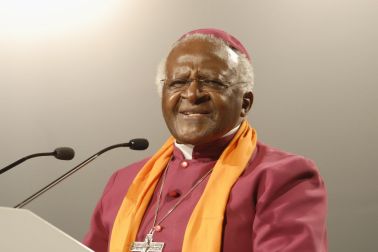
Source: picture-alliance / Getty
The legendary archbishop Desmond M. Tutu passed away on Dec. 26 after a difficult battle with prostate cancer. He was 90.
Tutu, a human rights activist and cleric, used his spiritual teachings to help bring down apartheid in South Africa. He was the country’s first Black African to serve as the Bishop of Johannesburg from 1985 to 1986 and the Anglican archbishop of Cape Town from 1986 to 1996.
After apartheid ended in the early 1990s’ Tutu worked to mend a new relationship between white and Black South Africans as the chairman of the Truth and Reconciliation Commission (TRC). The steadfast change-maker documented the atrocities that occurred during the separative moment. He also used his findings as evidence to spreadhead the restorative justice system that allowed victims of apartheid to pubically come forth in a court-like setting to speak out against the injustices they had suffered. Perpetrators of violence could also testify and request amnesty from both civil and criminal prosecution. The TRC’s public hearings played a crucial part in South Africa’s transition into a free democracy.
RELATED CONTENT: Stunning Vintage Photos Of Iconic Black Women Across The Diaspora On International Women’s Day
Tutu used his preachings to cultivate nonviolence in Black South Africans’ struggle for freedom as the leader of the South African Council of Churches. The move earned him a Nobel Peace Prize in 1984.
According to the New York Times, Tutu passed away on Dec. 26 while at a care facility. The legendary peacemaker was first diagnosed with prostate cancer in 1997 and hospitalized multiple times from complications stemming from the disease. His death was officially confirmed by Cyril Ramaphosa, South Africa’s president, who referred to the anti-apartheid hero as “a leader of principle and pragmatism who gave meaning to the biblical insight that faith without works is dead.”
Back in 2010, Tutu told the New York Times that he would be stepping away from his activism work to live out his golden years spending time with his family and loved ones.
“I have been very fortunate to have been given opportunities to contribute in a small way to the development of our new democratic, exhilarating, exasperating nation, and to have traveled the world as a representative, first of our collective apartheid anxiety, and later, of our promise and our hope,” he said at the time, “The time has now come to slow down.”
RELATED CONTENT: In Memory Of: Beloved Stars We Lost This Year


0 Commentaires